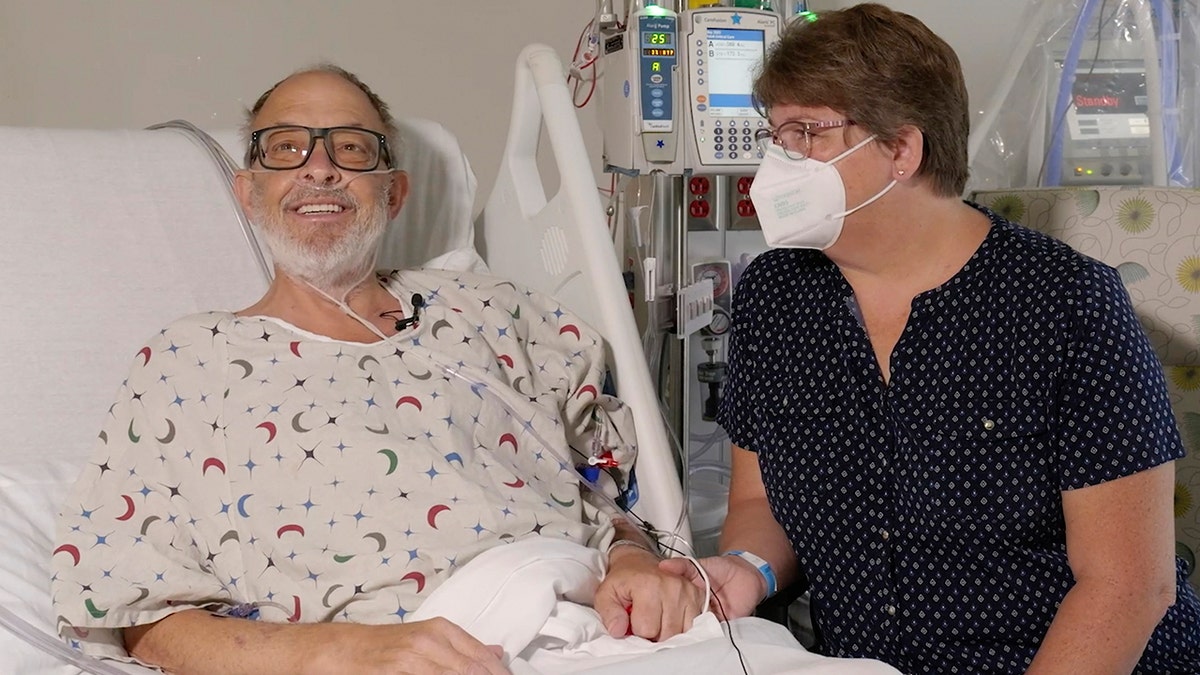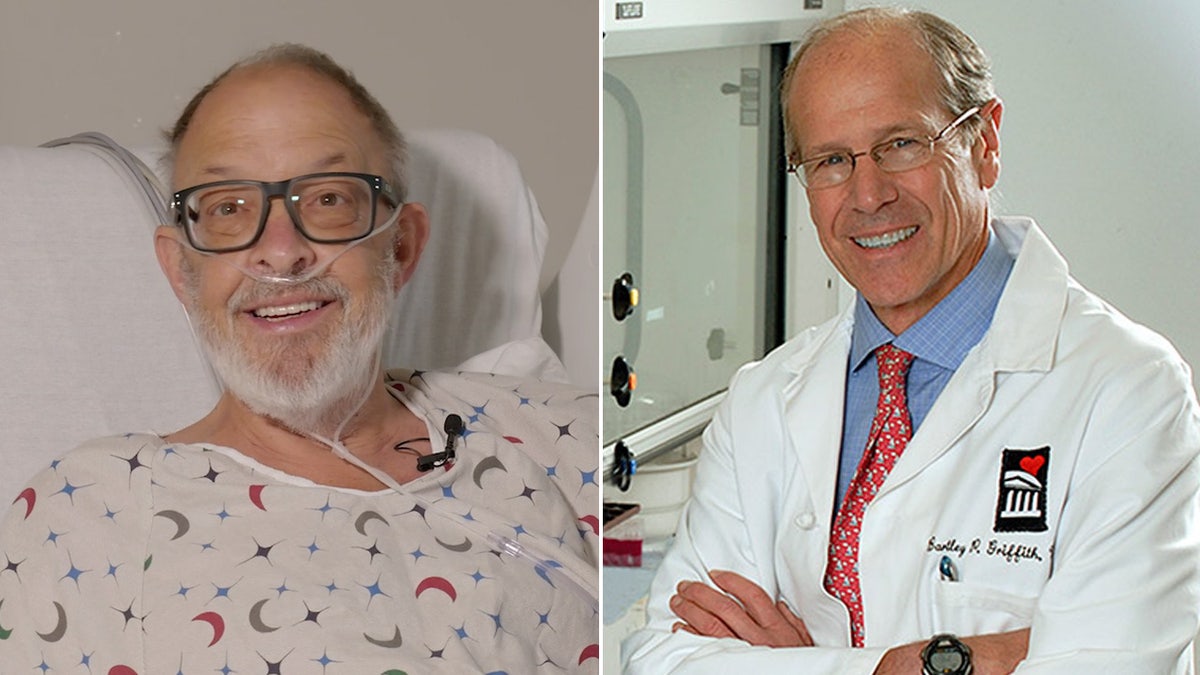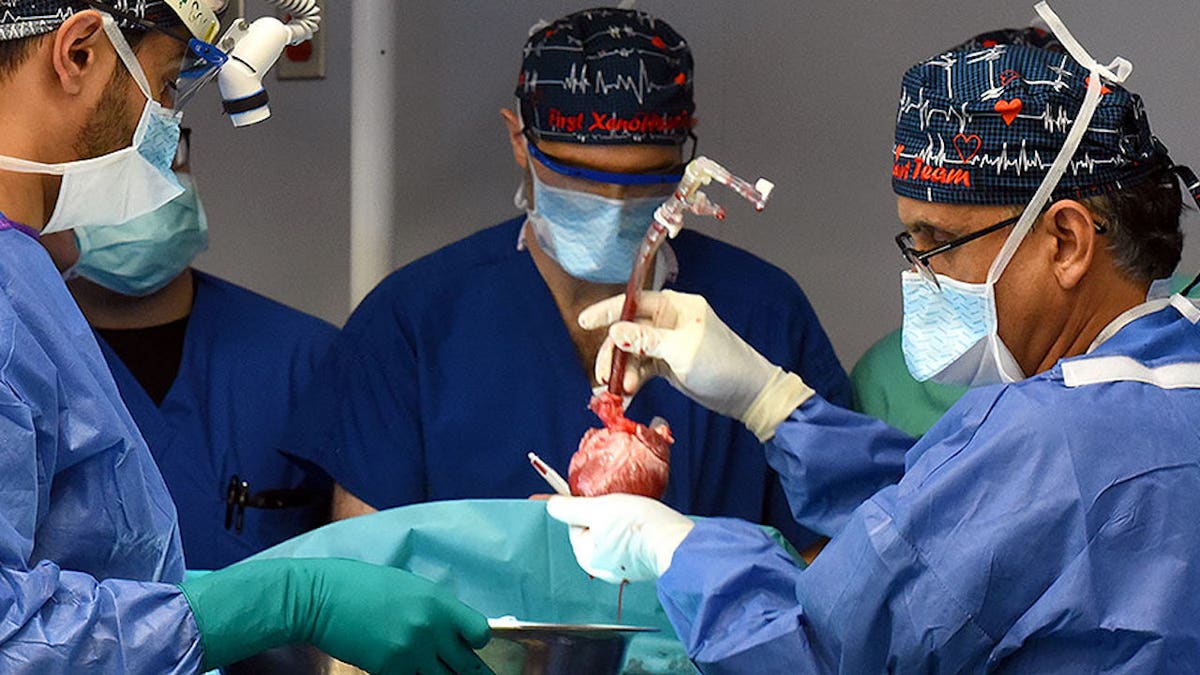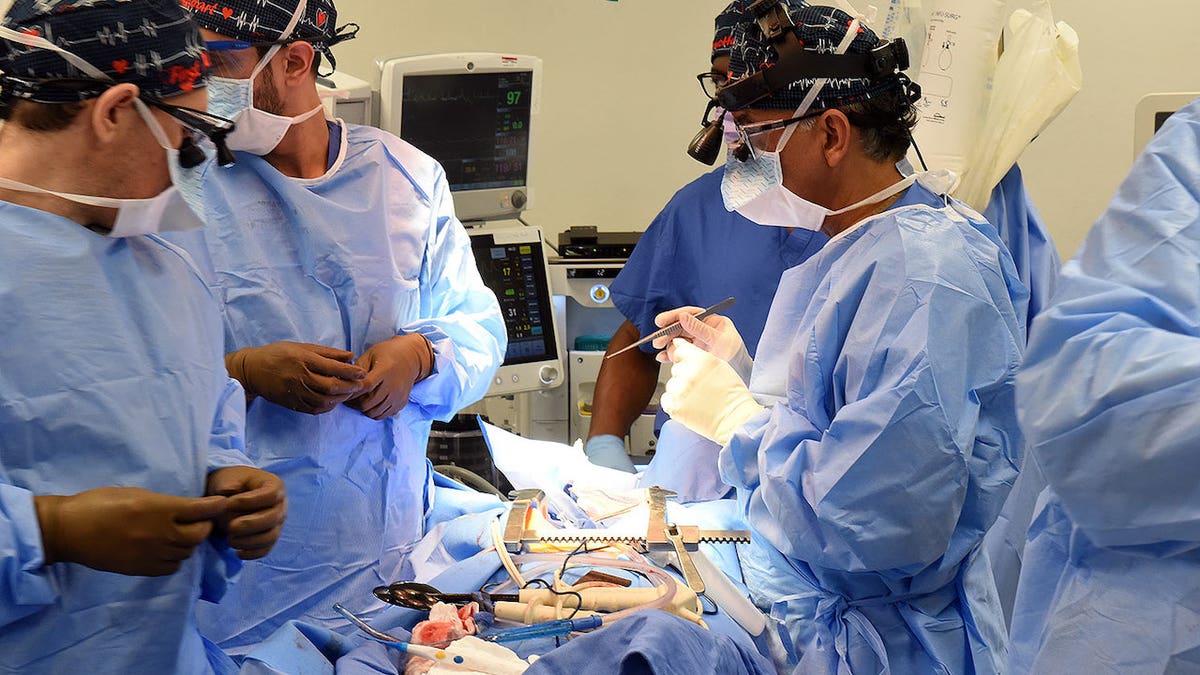Pig heart recipient’s ‘last wish’ was to help doctors learn from procedure, dying man said: ‘We will miss him’

[ad_1]
Lawrence Faucette, the recipient of the world’s second genetically modified pig heart transplant, has died nearly six weeks after the surgery, as announced by the University of Maryland Medical Center (UMMC) on Tuesday.
The 20-year Navy veteran and married father of two was 58 years old.
Faucette, who suffered from end-stage heart disease, had the experimental surgery on Sept. 20 at UMMC after receiving emergency approval from the U.S. Food and Drug Administration (FDA).
SURGEONS GIVE UPDATE ON PATIENT A MONTH AFTER EXPERIMENTAL PIG HEART TRANSPLANT: ‘NOW I HAVE HOPE’
Just last week, Faucette’s doctors released a statement saying that he was doing well and showed no signs of infection or rejection of the organ.
Since the surgery, Faucette had made “significant progress,” the statement said, as he attended physical therapy and spent time with his wife, Ann Faucette, and other family members.

In this photo provided by the University of Maryland School of Medicine, Lawrence Faucette sits with his wife, Ann, in the school’s hospital in Baltimore, Maryland, in Sept. 2023, before receiving a pig heart transplant. Faucette, the second person to receive a transplanted heart from a pig, has died, nearly six weeks after the highly experimental surgery, his doctors announced Tuesday, Oct. 31, 2023. (Mark Teske/University of Maryland School of Medicine via AP)
“In recent days, his heart began to show initial signs of rejection — the most significant challenge with traditional transplants involving human organs as well,” the statement said.
“Despite the medical team’s greatest efforts, Mr. Faucette ultimately succumbed on Oct. 30.”
“Mr. Faucette’s last wish was for us to make the most of what we have learned from our experience, so others may be guaranteed a chance for a new heart when a human organ is unavailable.”
“We mourn the loss of Mr. Faucette, a remarkable patient, scientist, Navy veteran and family man who just wanted a little more time to spend with his loving wife, sons and family,” said Bartley P. Griffith, M.D., who surgically transplanted the pig heart.
PIG KIDNEY STILL FUNCTIONING IN BRAIN-DEAD MAN 6 WEEKS AFTER TRANSPLANT SURGERY: ‘EXTREMELY ENCOURAGING’
“Mr. Faucette’s last wish was for us to make the most of what we have learned from our experience, so others may be guaranteed a chance for a new heart when a human organ is unavailable,” the doctor continued.
“He then told the team of doctors and nurses who gathered around him that he loved us. We will miss him tremendously.”

Larry Faucette, the patient who received the genetically modified pig heart, is pictured at left. Dr. Bartley Griffith, professor of surgery at the University of Maryland School of Medicine who performed the surgery, is shown at right. (University of Maryland Medicine)
Muhammad M. Mohiuddin, M.D., professor of surgery and program director of the Cardiac Xenotransplantation Program at University of Maryland School of Medicine (UMSOM), added, “We cannot express enough gratitude to Mr. Faucette and his family for enabling us to continue to make significant advancements toward making xenotransplants a reality.”
Mohiuddin noted that as a scientist, Faucette understood the important contribution he was making in advancing this field.
ULTIMATE FATHER’S DAY GIFT: SON DONATES KIDNEY TO SAVE HIS DAD’S LIFE
“As with the first patient, David Bennett, Sr., we intend to conduct an extensive analysis to identify factors that can be prevented in future transplants; this will allow us to continue to move forward and educate our colleagues in the field on our experience,” the doctor added.
David Bennett, 57, received the first genetically modified pig heart on Jan. 7, 2022.
Bennett’s transplant functioned well after the surgery, but the patient died from heart failure two months later.

Faucette’s surgeons are shown during the pig heart transplant. Before transplanting the pig’s heart, the scientists had to “knock out” three genes in the donor pig in order to prevent the recipient’s antibodies from rejecting the organ. (University of Maryland Medicine)
Faucette first arrived at UMMC on Sept. 14 with end-stage heart failure.
He was deemed ineligible for a traditional heart transplant due to his advanced medical conditions, including peripheral vascular disease, the university said in a statement.
The FDA granted the emergency authorization for the pig heart transplant on Sept. 15.
The surgery was a success and Faucette was making strides toward regaining his ability to walk before his body began to reject the heart.
LIFE AS A PATIENT IN NEED OF ORGAN DONATION: NEW HAMPSHIRE MAN WAITS FOR KIDNEY, READY TO ‘ROCK AND ROLL’
“This is a monumental achievement, and it takes Herculean efforts to move the transplant field forward,” said Christine Lau, M.D., MBA, chair of the Department of Surgery at UMSOM and surgeon-in-chief at UMMC, in the release.
“Lung transplants took decades to perfect, and the giants of those days carried a lot on their shoulders. Drs. Griffith, Mohiuddin and their entire treatment team, as well as Mr. Faucette and his family, are our heroes of today.”

UMMC surgeons are shown during the pig heart transplant. Faucette was only the second patient to undergo the experimental procedure. (University of Maryland Medicine)
The patient’s wife, Ann Faucette, also shared a statement.
“Larry started this journey with an open mind and complete confidence in Dr. Griffith and his staff. He knew his time with us was short, and this was his last chance to do for others,” she said. “He never imagined he would survive as long as he did, or provide as much data to the xenotransplant program.”
“This is a monumental achievement, and it takes Herculean efforts to move the transplant field forward.”
“He was a man who was always thinking of others, especially myself and his two sons,” she continued. “Larry was consistently telling the nurses, support staff, and doctors how much he appreciated what they were doing for him. He was not only thinking about how this journey was helping to advance the xenotransplant program, but how it affected his family.”
CLICK HERE TO SIGN UP FOR OUR HEALTH NEWSLETTER
“Larry’s family continues to be in awe of the man that he was and how he has shaped our lives. He can never be forgotten,” said Faucette’s wife.
CLICK HERE TO GET THE FOX NEWS APP
“The family thanks the staff at the University of Maryland Medical Center for the care given to Larry and the support given to family members through their many days.”
For more Health articles, visit www.foxnews.com/health.
[ad_2]